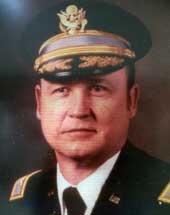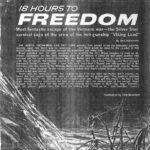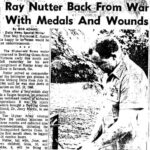Colonel Ray Nutter is a highly decorated American soldier and Vietnam War hero, renowned for his exceptional valor and distinguished career in the United States Army. Born in Scott County, Kentucky, Nutter’s journey from a talented high school athlete and Western Kentucky University football star to a senior aviator and master parachutist is truly remarkable. He earned four of the five top medals for valor, including the Distinguished Service Cross, for his extraordinary heroism as a helicopter gunship pilot with the 121st Aviation Company (Soc Trang Tigers) in the Mekong Delta.
A fifth-generation Kentuckian, Colonel Nutter’s military service began in 1954 after graduating from WKU’s ROTC program. He quickly rose through the ranks, serving with the 11th Airborne, in Germany on the East German border, and flying daily missions on the 38th Parallel in Korea with the 101st Airborne. He holds the distinction of being the youngest battalion commander in the U.S. Army while leading the Army Armor School at Fort Knox, Kentucky.
During his pivotal tour in Vietnam (1966-1967), Colonel Nutter commanded the “Vikings” gunship squadron, leading critical helicopter actions that earned him numerous accolades. His exploits during this period are chronicled in David Reed’s book, Up Front in Vietnam and lead to his nomination for the Medal of Honor.
Upon returning to the U.S., Colonel Nutter commanded the US Army Aviation School at Hunter Field, Georgia, training the next generation of helicopter pilots. His career continued with significant roles, including completing the Command and General Staff College at Fort Leavenworth, Kansas, and serving as the Secretary of the Army’s Chief of Legislative Liaison at the Pentagon in Washington D.C., where he played a pivotal role in Army communications with Congress.
After 22 years of active service, Colonel Nutter returned to Bowling Green, Kentucky, where he established a successful contracting business.
Colonel Ray Nutter’s awards and commendations include:
- Distinguished Service Cross
- Distinguished Service Medal with Oak Leaf Cluster
- Silver Star
- Legion of Merit
- Distinguished Flying Cross
- Soldier’s Medal
- Bronze Star w/V
- Purple Heart
- Meritorious Service Medal
- Air Medal with Oak Leaf Cluster
- National Defense Service Medal
- Vietnam Service Medal
- Vietnamese Cross of Gallantry with Palm
- Republic of Vietnam Campaign Medal
His incredible bravery is exemplified by the citation for his Distinguished Service Cross, which details his actions on October 18, 1966, near Vi Thanh, Republic of Vietnam, where he displayed exceptional valor under intense enemy fire, rescuing downed personnel and evading capture despite severe injuries.
Col Nutter was inducted into the Western Kentucky University Hall of Fame in 2024. He is honored by Aviation Heritage Park and Museum with a museum exhibit and a UH-1 Huey on display.
The following is an excerpt from the citation awarding him the Distinguished Service Cross:
The President of the United States of America, authorized by Act of Congress, takes pleasure in presenting the Distinguished Service Cross to Major (Infantry) Raymond T. Nutter (ASN: 0-79407), United States Army, for extraordinary  heroism in connection with military operations involving conflict with an armed hostile force in the Republic of Vietnam, while serving with 121st Assault Helicopter Company, 13th Aviation Battalion, 1st Aviation Brigade. Major Nutter distinguished himself by exceptionally valorous actions on 18 October 1966 while serving as platoon leader of an armed helicopter team supporting combat operations near Vi Thanh. Major Nutter led his aircraft in strikes at heavily fortified Viet Cong positions that were threatening a small friendly force. When two evacuation helicopters were forced to abandon attempts to reach the ground unit because of intense fire, Major Nutter decided to fly in for the pickup himself. As he brought his helicopter down, it was hit by a burst of fire which riddled the cabin, shot away the controls, and killed the other pilot. In the crash, Major Nutter suffered a large gash in his leg, but led the two crew members out of the aircraft and deeper into the swamp as the Viet Cong closed in on the wreckage. With the hope of escaping to friendly territory, they decided to move stealthily through the enemy positions, which were not under air and artillery assault. Hampered by his injury and beset by leeches and mosquitoes, he hacked his way through the swamp growths with a knife. On two occasions, when an armed insurgent attacked them, Major Nutter killed them with his knife. Suffering from cold, mosquitoes, and the pain of his wounds, and endangered by artillery fire all night, Major Nutter hid until morning in a rice paddy. Early the next day, he made contact with a friendly Vietnamese force. Major Nutter’s extraordinary heroism and devotion to duty were in keeping with the highest traditions of the military service and reflect great credit upon himself, his unit, and the United States Army.
heroism in connection with military operations involving conflict with an armed hostile force in the Republic of Vietnam, while serving with 121st Assault Helicopter Company, 13th Aviation Battalion, 1st Aviation Brigade. Major Nutter distinguished himself by exceptionally valorous actions on 18 October 1966 while serving as platoon leader of an armed helicopter team supporting combat operations near Vi Thanh. Major Nutter led his aircraft in strikes at heavily fortified Viet Cong positions that were threatening a small friendly force. When two evacuation helicopters were forced to abandon attempts to reach the ground unit because of intense fire, Major Nutter decided to fly in for the pickup himself. As he brought his helicopter down, it was hit by a burst of fire which riddled the cabin, shot away the controls, and killed the other pilot. In the crash, Major Nutter suffered a large gash in his leg, but led the two crew members out of the aircraft and deeper into the swamp as the Viet Cong closed in on the wreckage. With the hope of escaping to friendly territory, they decided to move stealthily through the enemy positions, which were not under air and artillery assault. Hampered by his injury and beset by leeches and mosquitoes, he hacked his way through the swamp growths with a knife. On two occasions, when an armed insurgent attacked them, Major Nutter killed them with his knife. Suffering from cold, mosquitoes, and the pain of his wounds, and endangered by artillery fire all night, Major Nutter hid until morning in a rice paddy. Early the next day, he made contact with a friendly Vietnamese force. Major Nutter’s extraordinary heroism and devotion to duty were in keeping with the highest traditions of the military service and reflect great credit upon himself, his unit, and the United States Army.






